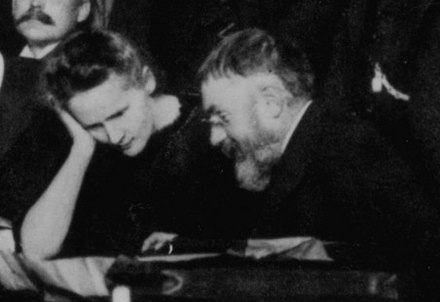
From Henri Poincaré:
Nov. 1911
My dear colleague,
Mr Einstein is one of the most original thinkers I have ever met. In spite of his youth, he has already achieved a very honourable place among the leading savants of his age. What one has to admire in him above all is the facility with which he adapts himself to new concepts and knows how to draw from them every possible conclusion. He has not remained attached to classical principles, and when faced with a problem of physics he is prompt in envisaging all its possibilities. A problem which enters his mind unfolds itself into the anticipation of new phenomena which may one day be verified by experiment. I do not mean to say that all these anticipations will withstand the test of experiment on the day such a test would become possible. Since he seeks in all directions one must, on the contrary, expect most of the trails which he pursues to be blind alleys. But one must hope at the same time that one of the directions he has indicated may be the right one, and that is enough. This is indeed how one should proceed. The role of mathematical physics is to ask the right questions, and experiment alone can resolve them.
The future will show more and more the worth of Mr Einstein, and the university intelligent enough to attract this young master is certain to reap great honour.
Your most devoted colleague,
Poincaré
From Marie Curie:
Paris, November 17, 1911
Dear Sir,
I have just received your letter, in which you asked for my personal impression of Mr. Einstein, whom I recently had the pleasure to meet. You also say that Mr. Einstein wishes very much to return to Zurich and could soon have the opportunity to do so.
I have often admired the papers published by Mr. Einstein on issues dealing with modern theoretical physics. Moreover, I believe that theoretical physicists agree that these papers are of the highest order. In Brussels, where I participated in a scientific conference in which Mr. Einstein also took part, I was able to appreciate the clarity of his mind, the extent of his documentation and the depth of his knowledge. If we consider that Mr. Einstein is still very young, we are right to have great hope in him, and to see him as one of the leading theoreticians of the future. I think that the scientific institution willing to give Mr. Einstein the work he desires, either by appointing him an existing chair or by creating for him the chair in the conditions he deserves, could be greatly honored by such a decision and would certainly be providing a great service to science.
If, by offering my opinion, I could by a small measure contribute to the solution desired by Mr. Einstein, I would be extremely pleased.
Accept, I beg of you, dear Sir, the assurance of my best wishes.
M. Curie
Faculty of Sciences, Paris
(General Physics Laboratory)
- The Time Albert Einstein Asked Marie Curie A Letter Of Recommendation To Secure A Job
- Henri Poincaré is often described as a polymath, and in mathematics as “The Last Universalist“, since he excelled in all fields of the discipline as it existed during his lifetime.
- When Bertrand Russell was asked by a French politician who he thought the greatest man France had produced, he replied without hesitation, “Poincaré”. The politician was surprised that he’d chosen the prime minister Raymond Poincaré above the likes of Napoleon, Balzac. Russell replied, “I don’t mean Raymond Poincare but his cousin, “the mathematician, Henri Poincaré.”
- Poincaré’s fame was so great, in fact, that just after World War I when the English philosopher Bertrand Russell was asked who was the greatest Frenchman of modern times he answered, “Poincaré,” without hesitation. Thinking he was referring to Raymond, Henri’s cousin who had become president of France, the questioner frowned. “No, not that Poincaré,” Russell said quickly. “Henri Poincaré”.
- Isaac Newton and Albert Einstein are among the scientists who experienced their own annus mirabilis, a miraculous year of breakthroughs.
- 1666 — The year of wonders: In 1666 Isaac Newton, aged 23, made revolutionary inventions and discoveries in calculus, motion, optics and gravitation. It was in this year that Newton was alleged to have observed an apple falling from a tree, and in which he in any case hit upon the law of universal gravitation (Newton’s apple). He was afforded the time to work on his theories due to the closure of Cambridge University by an outbreak of plague.
- Newton is not the only scientist said to have experienced a miraculous year of breakthroughs. Albert Einstein was 26 years old in 1905, when—while working as a patent office clerk in Bern, Switzerland, a job that he later said gave him time for thought experiments—he published four papers of major significance in the journal Annalen der Physik. They dealt with space, time, mass, and energy, topics that were central to the foundations of modern physics.
- 1905 — Albert Einstein: It was in this year that Albert Einstein, aged 26, published important discoveries concerning the photoelectric effect, Brownian motion, the special theory of relativity, and the famous \(E = mc^2\) equation. His four articles, collectively known as his Annus Mirabilis papers, were published in Annalen der Physik in 1905.
- Annus Mirabilis